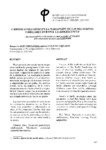Cambios evolutivos en la percepción de las relaciones familiares durante la adolescencia

View/
Use this link to cite
http://hdl.handle.net/2183/6654Collections
Metadata
Show full item recordTitle
Cambios evolutivos en la percepción de las relaciones familiares durante la adolescenciaDate
1998Citation
Revista galego-portuguesa de psicoloxía e educación, 1998, 2: 145-158 ISSN: 1138-1663
Abstract
[Resumen] El propósito de este estudio era investigar cómo cambian las percepciones del funcionamiento familiar (en términos de vinculación emocional y capacidad de cambio) a lo largo de la adolescencia. Los resultados de nuestro trabajo indican que a partir de la adolescencia intermedia los hijos perciben menor cohesión y adaptabilidad que sus padres. En términos ideales, todos los miembros de la familia desean mayores niveles de cohesión y adaptabilidad familiar, aunque las puntuaciones de los hijos a partir de la adolescencia intermedia son siempre menores que las de sus padres. Los resultados en satisfacción indican que los adolescentes desearían que sus familias fuesen más adaptables y cohesionadas, es decir, el funcionamiento familiar ideal para los adolescentes sería aquel que les permitiese mayores cuotas de autonomía, pero dentro de un ambiente relativamente cohesionado y de apoyo. [Abstract] The aim of this work was to study how perceptions of the family functioning (in terms of emotional bonding and ability to change) change during adolescence. Our results show that both in middle and late adolescence, children perceive their family as less cohesive and adaptable than their parents. All family members wanted higher levels of family cohesion and adaptability, although
children' s scores from middle adolescence were always lower than their parenf s scores. Results in family satisfaction show that adolescents wanted their family were more cohesive and adaptable, that is, they would be more satisfied if they had more autonomy but in a relatively cohesive and supportive family environment.
Keywords
Relaciones padres-hijos
Adolescencia
Vinculación emocional
Adaptabilidad familiar
Parent-child relationships
Adolescence
Emotional bonding
Family adaptability
Adolescencia
Vinculación emocional
Adaptabilidad familiar
Parent-child relationships
Adolescence
Emotional bonding
Family adaptability
ISSN
1138-1663





